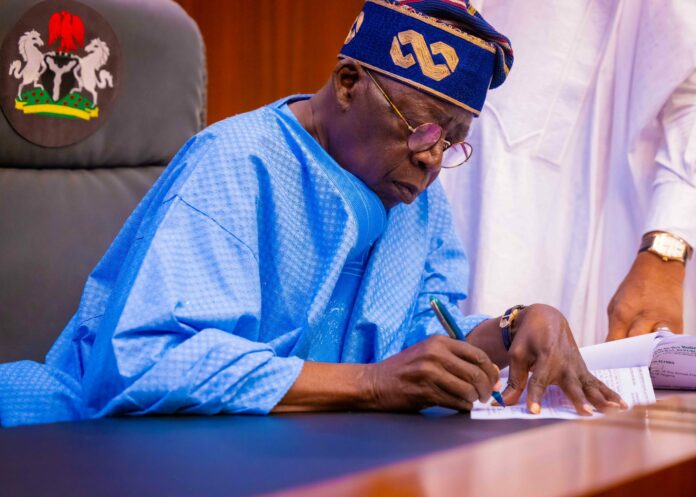After months of deliberations between government authorities, labour unions, and the private sector, President Bola Tinubu has assented to the minimum wage bill into law.
Tinubu signed it at the State House in Abuja on Monday days after the National Assembly had passed the N70,000 per month minimum wage bill.
Straightnews learnt that the speedy passage of the bill coupled with the assent into law appears as a ploy by the Federal Government to douse tension and quell angst of workers against the authority during the proposed protest by NLC and other civil liberties organisations billed for August 1, 2024.
A National Assembly delegation led by the President of the Senate, Godswill Akpabio and some members of the House of Representatives were around to witness the ground-breaking event.
You may also read
- FG, Labour Approve ₦70,000 as New Minimum Wage- Minister
- Labour insists on N250,000 New Minimum Wage
- NLC President Alerts Plan to Remove Minimum Wage from Exclusive List
Recall that the Nigerian Senate on Tuesday, July 23, passed the minimum wage amendment bill, after the bill speedily scaled through first, second and third readings.
The Senate unanimously voted for the consideration and approval of the bill minutes after it was transmitted to it by President Bola Tinubu.
Following the signing, the Special Adviser to the President on Senate Matters Basheer Lado said the move is a promise kept.
“The signing of the minimum wage bill into law by His Excellency, President Bola Ahmed Tinubu is both a promise kept and a demonstration of his people-centric governance model,” he said in a statement.
“Tinubu promised to pay a living wage to Nigerian workers during his electioneering campaigns and he has kept that promise.”
President Tinubu’s move followed months of talks with labour unions which insisted on a new minimum in the wake of the fuel subsidy removal and the floating of the naira – both steps ballooning the cost of living.
Labour unions had initially proposed ₦494,000 as a new minimum wage with the government offering ₦60,000. After a series of negotiations, the workers demanded ₦250,000 while the government shifted grounds to N62,000.
But on July 18, the Federal Government and the unions reached a consensus figure of ₦70,000.
“We are happy to announce today (Thursday) that both the organised labour and the Federal Government have agreed on an increase on the N62,000 minimum wage. The new national minimum that Mr President is expected to submit to the National Assembly is ₦70,000,” the Minister of Information Mohammed Idris told State House correspondents after a meeting between government officials, and labour leaders.
Governors across the country’s 36 states had opposed the N60,000 minimum wage initially proposed by the federal government.
The governors rejected the proposal in a statement by the director, media and public affairs of the Nigeria Governors’ Forum (NGF), Halimah Salihu Ahmed, on Friday, June 7.
The workers had embarked on a strike on Monday, June 3, and relaxed it the following day, to compel the government to agree on an acceptable minimum wage.
The suspension of the industrial action was at the heel of the resolution reached between the federal government representatives and the labour after a six-hour meeting in the evening of Monday, June 3, in Abuja.
Wage Review
The ₦70,000 will also be reviewed every three years. After the truce, President Tinubu immediately transmitted the bill to the National Assembly for passage. The lawmakers wasted no time in doing that, passing the bill in one day.
While labour had also insisted on a better deal for workers owing to the hike in the cost of living, Tinubu who swept to power in May last year had promised that his government would only pay what is sustainable.
“You have to cut your coat according to the available cloth. Before we can finalise the minimum wage process, we have to look at the structure,” Tinubu insisted after meeting labour leaders.

